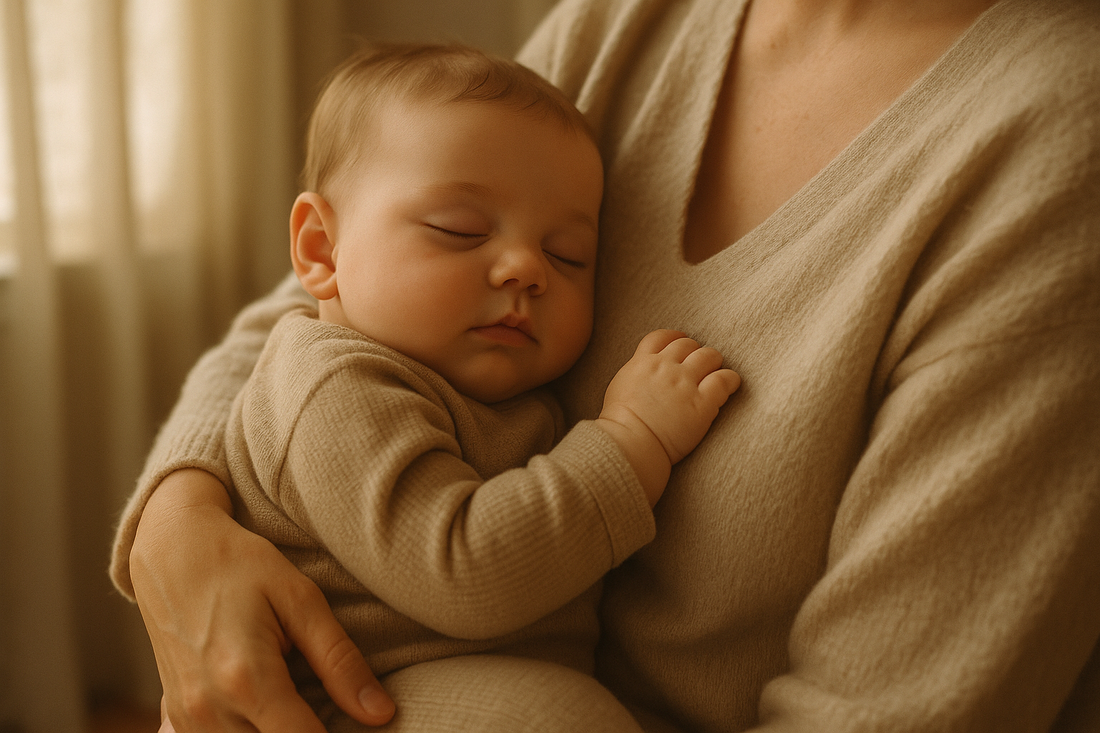
When Do Babies Start Sleeping Through The Night
Share
It’s one of the most common questions new parents ask — “When will my baby finally sleep through the night?”
If you’ve found yourself Googling this at 2 a.m. with your baby wide awake beside you, you’re not alone! Every parent wonders when those long, uninterrupted stretches of sleep will begin — and the truth is, there’s no single answer that fits every baby.
What “Sleeping Through the Night” Really Means
Before we talk timelines, it’s helpful to redefine what “sleeping through the night” actually means.
For most babies, it doesn’t mean 12 hours straight without waking. In research terms, it often means a stretch of 6–8 hours without needing a feed — and almost all babies still wake briefly between cycles, even if they don’t always call out.
According to the National Institutes of Health (NIH), most babies between 4–6 months begin to consolidate sleep, thanks to the maturing of their circadian rhythm (their internal biological clock). However, since sleep is a skill that needs to be taught, not one that is a given, it's around this age when you can begin helping them link sleep cycles and develop more predictable patterns.
Typical Sleep Progression by Age
While every baby is unique, here’s a general guide:
-
Newborns (0–3 months):
Sleep comes in short bursts, usually 2–4 hours at a time, day and night. Their sleep patterns are driven by hunger rather than daylight or routine. -
Around 4–6 months:
Many babies begin to sleep longer stretches overnight — sometimes up to 5–8 hours — as their ability to self-soothe improves and feeding needs spread out. -
6–9 months:
With a consistent routine and healthy sleep habits, some babies start “sleeping through.” Others still wake for a feed or comfort — both are perfectly normal! -
9–12 months and beyond:
By this stage, many babies are capable of sleeping 10–12 hours overnight, though teething, separation anxiety, or developmental leaps can still cause temporary disruptions.
While every baby’s timeline is different, there are several factors that influence how quickly your baby learns to sleep for longer stretches:
-
Feeding method: Breastfed babies may wake more frequently due to faster digestion compared to formula-fed babies.
-
Temperament: Some babies are naturally lighter sleepers.
-
Sleep environment: Light, noise, or room temperature can all affect how easily a baby settles and stays asleep.
-
Sleep associations: How your baby falls asleep (with rocking, feeding, or independently) can impact whether they resettle between cycles.
How to Support Healthy Sleep
You can’t force a baby to sleep through the night, but you can create the conditions that help it happen sooner:
-
Establish a consistent bedtime routine — bath, feed, story, bed.
-
Ensure your baby’s sleep space is safe, dark, and calm.
-
Give them a chance to self-settle before intervening.
-
Follow age-appropriate awake windows to prevent overtiredness.
The Bottom Line
Every baby’s sleep journey is different. Some will surprise you early; others will take their time — and that’s completely normal. What matters most is that you and your baby are rested, safe, and supported.
If you’re feeling exhausted or unsure about your baby’s sleep habits, it might help to speak with Dana, a certified baby sleep consultant who can guide you through evidence-based strategies tailored to your family. Book a support package that suits you today HERE
